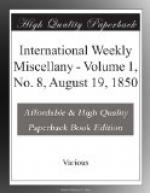In such circumstances we would suppose that the actors would lose all interest in their profession. But this is not the case. At least the cultivated portion of the public at Warsaw never go to the theater to see a poetic work of art, but only to see and enjoy the skill of the performers. Of course there is no such thing as theatrical criticism at Warsaw; but everybody rejoices when the actors succeed in causing the wretchedness of the piece to be forgotten. The universal regret for the wretched little theater on the Krasinski place, where Suczkowska, afterward Mad. Halpert, founded her reputation in the character of the Maid of Orleans, is the best criticism on the present state of the drama.
The Russians take great delight in the most trivial pieces. Even Prince Paskiewich sometimes stays till the close of the last act. To judge by the direction of his opera-glass, which is never out of his hand, he has the fortune to discover poetry elsewhere than on the stage. In truth the Warsaw boxes are adorned by beautiful faces. Even the young princess Jablonowska is not the most lovely.
The arrangements of the Warsaw theaters are exactly like those of the Russian theater at St. Petersburg, but almost without exception, the pupils of the dramatic school, of whom seventeen have come upon the boards, have proved mere journeymen, and have been crowded aside by performers from the provincial cities. None of the eminent artists of late years have enjoyed the advantages of the school. The position of the actors at Warsaw is just the same as at St. Petersburg. The day after their first appearance they are regularly taken into duty as imperial officials, take an oath never to meddle with political affairs, nor join in any secret society, nor ever to pronounce on the stage anything more or anything else than what is in the stamped parts given them by the imperial management.
Actors’ salaries at Warsaw are small in comparison with those of other countries. Forty or fifty silver rubles a month ($26 to $33) pass for a very respectable compensation, and even the very best performers rarely get beyond a thousand rubles a year ($650). Madame Halpert long had to put up with that salary till once Taglioni said to Prince Paskiewich that it was a shame for so magnificent an artist to be no better paid than a writer. Her salary was thereupon raised one-half, and subsequently by means of a similar mediation she succeeded in getting an addition of a thousand rubles yearly under the head of wardrobe expenses. This was a thing so extraordinary that the managing General declared that so enormous a compensation would never again be heard of in any imperial theatre. The pupils of the dramatic school receive eighteen rubles monthly, and, according to their performances, obtain permission every two years to ask an increase of salary. The period of service extends to twenty-five years, with the certainty of a yearly pension equal to the salary received at the close of the period.




